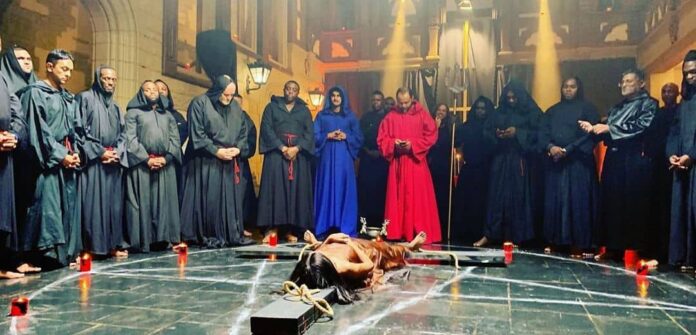The Federal Government’s plan to ban the portrayal of money rituals, ritual killings, smoking, and the glamorization of such acts in Nigerian films is sparking diverse reactions.
This decision was announced by Dr. Shaibu Husseini, Executive Director/CEO of the National Film and Video Censors Board (NFVCB), during a recent national stakeholders’ engagement on a smoke-free Nollywood, held in Enugu. The event was organized by the NFVCB and Corporate Accountability and Public Participation Africa (CAPPA), gathering movie producers, directors, and actors from across the country.
Leaders of various guilds and associations in the Nigerian film industry also attended the event. Husseini emphasized that the glamorization of smoking, ritual activities, and killings in Nigerian films is a significant issue requiring urgent and bold action from parents, guardians, and stakeholders.

He explained: “When my predecessor approached the former Minister of Information, Alhaji Lai Mohammed, about the need to legislate against the depiction of smoking in Nigerian movies, the inclusion of money rituals was also considered necessary. Other prohibitions include ritual killings and the glamorization of crimes to further sanitize the film industry.”
Husseini announced that the Minister of Arts, Culture, and Creative Economy, Hannatu Musawa, has approved the regulation, according to section 65 of the NFVCB Act 2004. The approved regulation, titled ‘Prohibition of Money Ritual, Ritual Killing, Tobacco, Tobacco Products, Nicotine Products Promotion, and Glamorization Display of Crimes in Movies, Musical Videos, and Skits Regulations 2024,’ has been forwarded to the Federal Ministry of Justice for official gazette.
The sensitization program aims to educate stakeholders about the dangers of smoking in Nigerian movies. Besides health implications, glamorizing smoking in films negatively influences teens and young adults, who form the largest segment of Nigerian movie viewers. The board plans to conduct enlightenment programs in secondary schools, tertiary institutions, local communities, faith-based groups, and other institutions.
“As you all know, the film industry plays a crucial role in the entertainment and creative sector. It is imperative to prioritize the industry’s progress. The NFVCB supports smoke-free movies and a smoke-free Nollywood. We seek your collaboration to develop creative content that discourages smoking and promotes positive health messages,” Husseini stated.
Stakeholders in the industry are divided over the policy. Actors and actresses shared divergent views on the development.
Veteran Nollywood actor Bob Manuel Udokwu remarked that the government’s intentions were being misunderstood by many. He said, “The restrictions about smoking and certain other practices, like ritual scenes in Nollywood films, are being misreported as a ban by the media. There is no outright ban; rather, the Federal Government, through the NFVCB, is ensuring that filmmakers do not inadvertently promote smoking and ritual acts. These can be included when it’s essential to tell stories, like in documentaries and true life stories.”

Udokwu added that he had a fruitful conversation with Dr. Husseini, who assured him that his role is to enhance the classifications and content of movies, music videos, skits, and similar media to ensure dignity and suitability for various audiences.
On the other hand, Nollywood actress Jennifer Obodo criticized the government for focusing on this issue instead of addressing more pressing national concerns. “The first question I asked when I saw this was—do they only watch the beginning of movies and forget the end? Movies are a form of storytelling, not just the narrative itself. If the government wants to ban smoking, it should start by banning the sale or production of cigarettes. They should focus on making Nigeria a better place, not on banning smoking and rituals in Nollywood.”
Actress Ngozi Eze Evuka argued that movies educate and entertain rather than corrupt viewers. She warned that banning these acts could lead to further censorship, including the prohibition of sexual acts, witchcraft acts, and native doctor acts in films.
Nnaemeka Charles Eze (Nani Boi) pointed out that the government should not prioritize this issue amid the numerous challenges facing the country. He highlighted that many Nollywood movies depicting rituals end with moral lessons that educate viewers on the consequences of evil deeds.
Nelson Bright viewed the ban on smoking in movies as a positive step in combating human trafficking and illegal organ harvesting but noted that it infringes on personal liberty and artistic expression. He warned that it might drive talented filmmakers away from Nigerian cinema and lead to a loss of authentic storytelling.
Don Sylvester Nweke, CEO of Don Sylvester Records, and a patron of the Association of Movie Producers and Nollywood in Lagos, stated that the ban was unnecessary. He argued that censorship should be implemented instead, ensuring that films depicting smoking or ritual acts end with consequences for such actions.
Maxi Okwu, former national chairman of the All Progressives Grand Alliance (APGA), raised concerns about the infringement on fundamental rights. He emphasized that while the government might have a point in enforcing the ban, it must respect the constitution, which guarantees every Nigerian the freedom of thought, conscience, and religion.
In summary, stakeholders have mixed reactions to the government’s move, with some supporting the initiative to protect viewers from harmful influences and others arguing for a focus on more pressing national issues and the preservation of artistic freedom.




